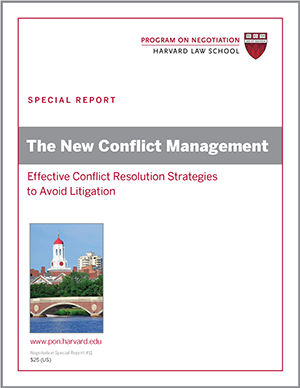
In their book Difficult Conversations: How to Discuss What Matters Most (Penguin Putnam, 2000), authors Douglas Stone, Bruce Patton, and Sheila Heen tell us how to engage in the conversations in our professional or personal lives that make us uncomfortable by examining a case study of conflict management. Tough, honest conversations are critical for managers, whether they need to change the group culture, manage conflict within a team, give a negative performance evaluation, disagree with others in a group, or offer an apology.
To set the stage for a productive discussion, open a difficult conversation with the “Third Story,” advise the authors of Difficult Conversations. The Third Story is one an impartial observer, such as a mediator, would tell; it’s a version of events both sides can agree on. “The key is learning to describe the gap—or difference—between your story and the other person’s story. Whatever else you may think and feel, you can at least agree that you and the other person see things differently,” Stone, Patton, and Heen write.
Suppose two regional sales reps share responsibility for sending weekly updates to their manager. Brad always submits them on time, but Frank often turns them in late. Saying, “Frank, you’ve turned in the sales reports late again” would only put Frank on the defensive. Instead, Brad opens the conversation this way: “Frank, you and I place a different value on deadlines. I want to explain why meeting them is important to me, and then I’d like to hear your take on them.”
Brad learns that Frank, when faced with the choice of possibly making a sale or compiling the report, thinks he should focus on the sale. With this insight, Brad proposes another way to share responsibilities: Brad will complete the report when it’s Frank’s turn to do so, as long as Frank gives Brad two hours’ notice and a share in any commission Frank earns as a result of being able to continue pursuing a lead.
What are your favorite conflict management methods?
Related Conflict Resolution Article: Conflict Management Skills When Dealing with an Angry Public – Here is some negotiation advice drawn from a case study of conflict management dealing with an angry public.
Adapted from “How to Say What Matters Most,” by Susan Hackley (former managing director, Program on Negotiation), first published in the Negotiation newsletter.
Originally published in 2010.





